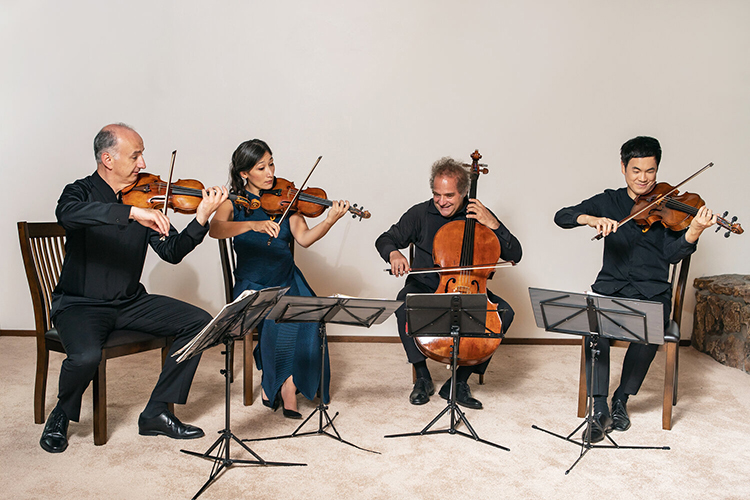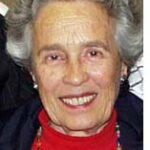
By Eileen Wingard

LA JOLLA, California — The Takács String Quartet, now celebrating its 50th anniversary, performed a memorable concert Saturday night, Oct. 26, in the Baker-Baum Hall of the Conrad in La Jolla. Of the original four student members at the Franz Liszt Academy in Budapest, only the cellist, 75-year-old András Fejér, remains. But the uncanny melding of their instrumental voices into a unified whole continues to characterize their playing, as demonstrated by their performance of quartets by Haydn, Ravel and Beethoven in the La Jolla Music Society-sponsored concert. Their main goal, according to cellist Fejér, is to fully embrace what the composer wanted, and that goal seemed to be fully met at last Saturday s performance.
The opening work, Haydn’s String Quartet in C Major, opus 54, No. 2, began with a phrase whose upward motion and pause seemed to indicate a light-hearted question, as the second violin, Harumi Rhodes, leaned in toward the first violin, Edward Dusinberre. Dusinberre continued as the dominating voice, joyously scampering to the upper reaches of the fingerboard. The second movement had a somber melody in the lower strings with the first violin embellishing their theme. This led into the third movement Minuet, whose trio was unusual, with sounds of anguish. Perhaps it was because Haydn’s principal second violinist in the Esterhazy orchestra was leaving and this work was dedicated to him. The last movement, usually a Rondo, began and ended slowly, with a Rondo-like allegro section only occurring once, and ending in the slower tempo. This quartet illustrates Haydn’s inventiveness and willingness to deviate from the norms.
The Ravel Quartet, written when the composer was still a conservatory student, sparkled with its innovative subjects, brought back in other guises in all four movements. The second movement was particularly spectacular with its driving Scherzo pizzicato theme. Its return was hinted at first, then gradually blossomed into the original statement. The slow movement featured some lovely solos by the newest member of the quartet, violist Richard O’Neill. The final movement included a great deal of tremolo, veiling the music in impressionistic sound.
After intermission, the Takács Quartet returned to play the first Razumovsky Quartet. Count Razumovsky was the Russian emissary to Vienna when Beethoven lived there, and the count, a great music lover, commissioned Beethoven to write a set of three quartets, each one to incorporate a Russian theme. These three Razumovsky Quartets set new standards for quartet writing and, because of their range of expression and gigantic scale, are often called symphony quartets. No. 1 in F Major is forty minutes long. The first movement was introduced by a cello solo, beautifully played by cellist András Fejér. It reached a massive climax before the end of the movement. The second movement, a Scherzo, again opened with the cello playing a repeated note before the main theme entered. The third movement reflected sorrowful melancholy, moving, without pause, into the finale. The last movement, marked Theme russe: Allegro, had the required Russian melody, played by the cello. The finale reached a rousing conclusion.
Harumi Rhodes came from a very musical family. Her father, Samuel Rhodes, was the violist with the Juilliard Quartet for over three decades and now heads the viola department at the Juilliard School, while her mother, Hiroko Yajima, was the second violinist of the Galimir Quartet. Rhodes studied at the Juilliard School and at the New England Conservatory.
The Takács’ busy 50th year anniversary schedule includes a concert at the Franz Liszt Academy in Budapest, Hungary. where cellist Fejér, Gabor Takács-Nagy and Karoly Schranz, violins, and Gabor Ormai, viola, formed the original Takács Quartet 50 years ago.
*
Eileen Wingard, a retired violinist with the San Diego Symphony Orchestra, is a freelance writer specializing in coverage of the arts.